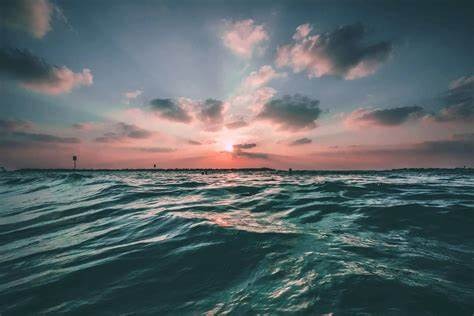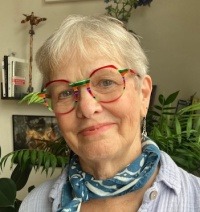FOUR MICRO NONFICTION PIECES
ALM No.68, September 2024
ESSAYS


Neruda at the Other End of the World
A young friend reads me Neruda from the western side of the mountains of Chile at 3:45 PM across the world from this hospital, this place where blue scrubs and wheel chairs, crutches and signs for the OR abound, where the afternoon temperature outside is 100, and I close my eyes and lean back in a lobby chair waiting for my partner’s biopsy, a “procedure” they refer to it here, and I’m looking on my phone as everyone else does and I find my friend at the other end of the planet, smiling, reading love poems: drink sky behind pines, her voice as clear as the cold sky behind her, her cheeks rosy, her eyes bright, not a cloud to be seen, kisses like roses, hardened by passions, and I am gladdened, even as I wait for the news then drive my partner home through the thick Boston traffic in a rainstorm thinking about Neruda in a young woman’s backpack, my life divided into dreams with parallel bodies, poetry and youth.
Almost
It’s a school night on McKinley Street on your way to Raymond Street where your grandparents live. Your mothers and sisters are there already for dinner. You’ve just finished your homework, maybe a phone call to your horn-blowing boyfriend, so you set out walking with your hands in your jeans pocket. The spring air is warm, and you know you’re headed towards summer as you stroll down a familiar street. The sky is dark gray, or maybe dark blue, but the streetlights have come on. In the near distance you see another teenager coming your way, and just as he nears, you say hi, and he immediately punches you in the gut, hard and fast. You keep walking with confusion—did this really happen? And if so, why? But you keep walking as if it didn’t happen, only to hear his heavy footsteps running back towards you. Something in that moment altered reality, coated with terror and a new knowledge of trust. You run as fast as you have ever run before. Your heart feels like it’s crashing in your chest, your legs suddenly strong and determined. You turn right onto Raymond and continue until you find the house, pound on the door, your head turning to see if the stranger is still there. Police are called. But nothing is ever said, nothing found out, only your innocence is taken away. Your nerves forever on edge in the dark. Dreams of strangers. Fearful surprises.
The Light Returns Me to Childhood
Like a mystery stored in my body, the light of today remembers the fullness of the sun over the base in North Carolina as young soldiers march by, and my father salutes the officers. Or the winter sun slowly peers over the Alps, one ray at a time so that the ice on my father’s blue Opel station wagon melts, and the army brats come out in snowsuits to play “King of the Mountain” on top of a large snow pile swept to the end of the block. Sometimes the light hides behind clouds over Hitler’s former SS base across the street as my mother takes down the diapers drying on the communal clothesline shared with the other army wives. The lights are timed in the hallways of each stairwell of our stucco apartment buildings because after the war electricity is in short supply. The pines along the barbed wire fence look black in the light of dawn. The sky changes by the hour. The trees stand so close together, I’m told, that their roots wrap around each other for support and comfort. Look, it’s a metaphor like most things I study today. It’s the forgotten search for implication. It’s the raw ticking of time suspended between two countries. I keep translating everything I see these days into possibilities as I search the world for answers and study the puzzle of my own life. They say memory and regret can mingle. They say the body recalls what the mind tries to forget when the lights go out. They say the sun returns after storms.
Maybe a War, Maybe a Party, Maybe a Sandcastle
On the beach I listen to the French who came down to Mexico from Montreal, the men with their greased big bellies, the young all smooth and tattooed, the women with barely any bathing suits. I enter the emerald green or sometimes turquoise waters. The further out I go it gets darker, so I pause fearing sharks, a life-long fear. The tiny angel fish and needle-nose fish, the ones I recognize from fish tanks, move through the waters close to shore.
A man dressed all in white with a big-brimmed hat on the beach builds a heart, a peace sign, a mosque, buildings with entrances and windows in the sand, and then places international flags on every precipice. He adds small child-like figures like a pink pony, a nun, and a ninja warrior. People come to notice and talk with the artist. They take photographs and ask questions. By morning I suspect his art will be gone like a Zen mandala. Art for art’s sake. The NOW, not the future. I should have asked.
Two nearby seniors juggle balls back and forth like teammates. When they finally stop, they bring fists together to say something about camaraderie or pure fun. People come by selling necklaces and chocolate bars and watermelon and stuffed animals and painted bowls. I want all of it and none, maybe desire it only to help their lives. Or to purchase souvenirs for my grandchildren. But I’ve brought no money with me purposely, so the choice is easier.
You would think all is well in the world, but amid this beach paradise with its French and German and English and Spanish spoken, two camouflaged soldiers walk by with their AK47s pointed to the ground. Their faces wrapped with a black scarf like terrorists. Wearing black boots, they walk up and down the beach as if looking for someone. When a beach mobile passes by later filled with three marines with rifles, no one seems to notice, but I feel like I’ve entered Chechnya, or Berlin, or Vienna, or Kiev or Zaire. I fear the calm before the storm. But who am I to point out the worst of mankind? Maybe they are here only to protect us. I lived once near Dachau and the Iron Curtain and learned to fear the worst. Fear still lingers all these years later. In the meanwhile, two women in bikinis carry bottles of wine as they walk by my beach chair. Maybe towards a party. Well beyond any war.
Gail Hosking is the author of the memoir Snake’s Daughter (U of Iowa Press) and two books of poems Retrieval and Adieu(Main Street Rag Press). MFA from Bennington Writing Seminars. Essays and poems have appeared in such places as Waxwing, Post Road, South Dakota Review, and The Healing Muse. Several pieces have been anthologized. Twice “most notable” in Best American Essays.


